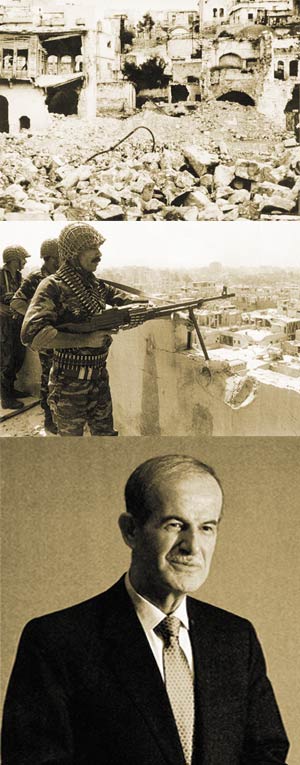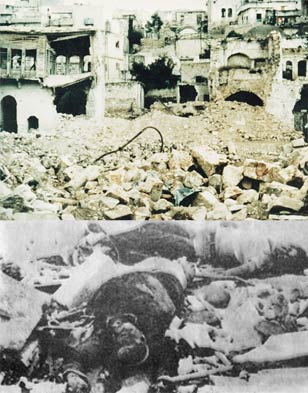Syria - The History of Terrible Oppression Hidden from The World
 |
Syria, with its 75 percent Muslim, 11 percent Nusayri, and 9 percent Christian population, has a long Islamic past and a deep-rooted cultural heritage. Many Islamic scholars have come from this land.
Syria was conquered during the time of Khalif Omar, and came to be ruled in turn by Umayyads, Abbasids, Seljuks and Ayyubids. The lands of Syria became part of the Ottoman Empire in 1517, and they lived in peace and security until the first part of the nineteenth century. In 1831 Syria fell into the hands of Muhammad Ali Pasha, who rebelled against the Ottomans and set up his own government. Syria then returned to Ottoman rule until it was occupied by French forces in 1920. The French occupation was the beginning of a time of disorder and violence for the Syrian people. The French tore Syria from Lebanon, which the latter had historically been a part of, and made it into a separate state.
 |
The 26-year policy of oppression that lasted until independence in 1946 was similar to those inflicted by the French government in Algeria, Tunisia and many other Muslim countries. The Syrian people began an important campaign of resistance in the wake of occupation. The French savagely killed tens of thousands of people and bombed large cities. The uprising was put down violently, but France realized that its days in Syria were numbered.
The French had to withdraw from Syria after World War II, and they accepted Syrian independence in 1946. The Syria that they left behind them, however, was a most unstable one, wide open to conflict. The French mandate imposed on Syria after the end of World War I benefited the Nusayris more than any other group. The French administration placed minority Nusayris in key state posts, creating great unease among the majority Sunni Muslims and planting the seeds of an artificial enmity between the two communities.
 |
Many experts on the Middle East believe that the Nusayris' climb to the country's highest political and military levels actually began with Syria's declaration of independence in 1946. Following independence, the most important event was the Nusayris' taking over the country's administration, displacing the long-established Sunni families who were in the forefront of the political and economic spheres. Artificial conflicts such as this dragged the newly independent Syria into.
Following independence, Syria became a nation of coups. They began in 1949 and continued until 1970 with the one carried out by the dictatorial Hafez Al-Assad. His regime put an end to the coups but brought with it a repressive administration. The Baath government ushered in a difficult time for Syrian Muslims. The country fell into the hands of the Nusayri minority, who represented only 11 percent of the population, and all other sects were removed from positions of influence. In a very short time the Assad regime, which described itself as a "Socialist Popular Democracy," imposed despotic rule on the country. All political parties were closed down, and it was forbidden to support any other political view than the socialist ideology favored by the Baath Party. Restrictions were imposed on all Islamic movements. The leaders of those movements were arrested and savagely tortured to the point of death. International human rights organization reports described how Syrian Muslims were subjected to great oppression and suffering during the Assad era, and how Muslim women were raped and unimaginable tortures inflicted on the men.
Cruelty and Oppression, Hallmarks of the Assad Era
 |
| Hafez Al-Assad |
The first aim of the Baath regime was to eliminate the country's Islamic identity. To that end, tens of thousands of Muslims were arrested without cause and tortured. Most were then executed, and others simply disappeared. The Assad regime employed such measures as raping women, beating them to death and hanging them by their heels. It also attempted to wear down the Muslim population by raiding houses, attacking mosques, and inflicting insults and endless harassment, and indeed it enjoyed considerable success in doing so.
 |
| The Hama people, known for their strong attachment to Islam, were savagely slaughtered in a massacre that lasted 27 days, led by Syrian leader Hafez al-Assad's brother Rifat. |
The worst example of the savagery of the Assad regime was the massacre carried out in the city of Hama. The sole reason for the destruction of that city was that Islamic movements were particularly powerful there. Rifaat Assad, the brother of Hafez and chief of the General Staff, directed a land and air attack on Hama one February night in 1982. The majority of those soldiers who declined to take part in the attack were killed on the spot. The city was left in ruins. As a result of 27 days of slaughter, some 40,000 Muslims lost their lives.
There were many other massacres and killings during Assad's three decades of dictatorship. Many Syrian Muslims who fled the Assad killings are still living abroad as refugees. There are approximately 1 million Syrian Muslims in Saudi Arabia alone.
As on other subjects, the policies of Bashar Assad, who took over the running of the state after the death of his father, maintain a positive attitude to religious communities in the country. We hope these positive results grow day by day and that Syria becomes a free, peaceful and just country where nobody is oppressed because of his beliefs or ethnic origins.
We must not forget, however, that none of the social problems in the Middle East and in other regions of the Islamic world are insoluble. At first sight, the problems in these regions may appear so complex as to be completely intractable. However, the solution has been sought for hundreds of years in the wrong places. The solution lies in living by the values of the Qur'an which Allah has revealed to humanity. Being helpless in the face of events is an unacceptable situation for any Muslim. That is because Allah, the Creator of all, has created a system wherein humanity can live in peace, well-being and security, and has revealed this to humankind by means of the Qur'an. In the Qur'an Allah shows us the true way in all matters, as is revealed in this verse, "... We have sent down the Book to you making all things clear and as guidance and mercy and good news for the Muslims." (Surat an-Nahl: 89)
 |
| Hafez al-Assad's brother Rifaat commanded the 27-day Hama massacre that began on Feb. 2, 1982. Rifaat was given complete authority by his president brother, and he commanded 12,000 soldiers, including special forces. One-third of the city of Hama with a population of 350,000 was destroyed. Some 30-40,000 civilians were killed, and nothing was heard of another 15,000. Thousands of residents had to flee. Mosques and historical buildings were torn down. The Syrian government took all necessary measures to ensure that news of the massacre didn't reach the foreign press. All communication with the city was cut off, and nobody was allowed in or out. Even so, they were still unable to cover up this vile massacre. |
If the superior morality described in the Qur'an is understood and followed, then all the problems currently facing the world can begin to be solved with great ease. Since the solution lies in living by Qur'anic morality, then all people of good conscience have a large and important responsibility to explain the Qur'an to others. In the Qur'an, the ambassadors sent down by Allah speak of their own responsibility in this manner:
We are only responsible for clear transmission.(Surah Ya Sin: 17)
 |
| Allah calls to the Abode of Peace and He guides whom He wills to a straight path. |
- Foreword
- Introduction - A Call To All People of Conscience ...
- Danger Facing The Islamic World - The Anti-Islamic Alliance Facing Muslims
- Chechnya - Oppression as The Whole World Watches
- Kashmir - The Muslims of Kashmir are Waiting for Help
- East Turkestan - Savagery hidden by the communist Chinese Government
- Bosnia, Kosovo and Macedonia - The peoples of the Balkans dragged from one war to Another
- Algeria - The Bloody Toll of Endless Cruelty and Oppression
- Tunisia - A People Oppressed Solely for Their Faith
- Eritrea and Ethiopia - Muslims Want Peace and Security
- Chad - The Muslim country the colonialist French administration tried to destroy
- Somalia - A Poor Nation in the Midst of Civil Wars
- Djibouti - Oppression in Africa’s Smallest Country
- Sudan - A Country Trying To Escape Fighting and Civil War
- Uzbekistan - Former Communists Continue To Oppress Muslims
- Afghanistan - Endless Civil Wars Due To Communist Savagery
- Iraq - Middle East Fascism: Saddam Hussein
- Syria - The History of Terrible Oppression Hidden from The World
- The Oppression of Muslim Minorities - Muslims Trying To Live By Their Religion
- Conclusion
